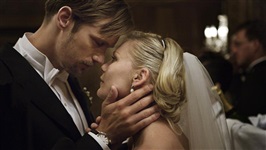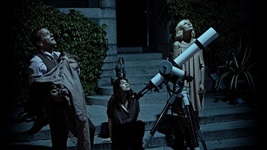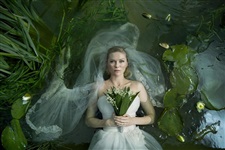Melancholia (2011)
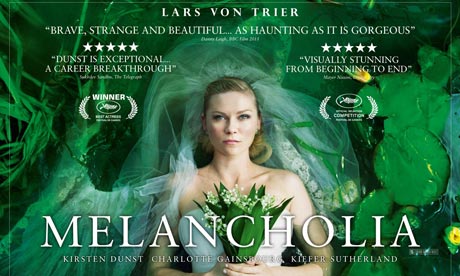
Advertising copy writer Justine (Kirsten Dunst) is getting married to the boss's son, a handsome and wealthy young man who seems to be a thoroughly good catch. Her sister Claire (Charlotte Gainsbourg) has arranged an elaborate and expensive wedding ceremony for the happy couple... the only drawback being that their estranged parents have to be invited.
Meanwhile, a rogue planet dubbed Melancholia has swept into the solar system and is heading for a close flyby of the earth, promising spectacular views and an experience never before witnessed by human eyes. The scientists have assured the public that there is no risk of a collision, but skeptics have pointed out that these calculations always have a certain margin of error...
Lars Von Trier is one of the most restlessly creative directors working in cinema today, a shameless provocateur whose style varies tremendously from film to film (or trilogy to trilogy anyway). He founded the Dogme 95 movement, the "vow of cinematic chastity" intended to force film makers to forgo the kind of cinematic artifice he had exploited in his early pictures and focus on the basics - a good story with strong characters and great performances from the cast. He never quite managed to follow his own rules, but his attempts to stick to the manifesto made for some extremely powerful films. Following that he went even more minimalist for his "trilogy in two parts" currently consisting of Dogville and Manderlay, then allowed a little more cinematic 'trickery' into his arsenal for the uncompromisingly controversial ANTICHRIST.
MELANCHOLIA represents an almost full re-acceptance of the tools available to a film-maker, including special effects, a musical score and a large cast and crew on set. It opens with a remarkable 7 minute sequence set to Wagner's prelude to Tristan und Isolde, itself a prelude to the film featuring a sequence of beautifully composed and composited sequences filmed in ultra slow motion. The film then cuts to the beginning of the narrative and the resumption of normal time, shot with a roving hand-held camera and jumpy cuts a little more reminiscent of the Dogme 95 films.
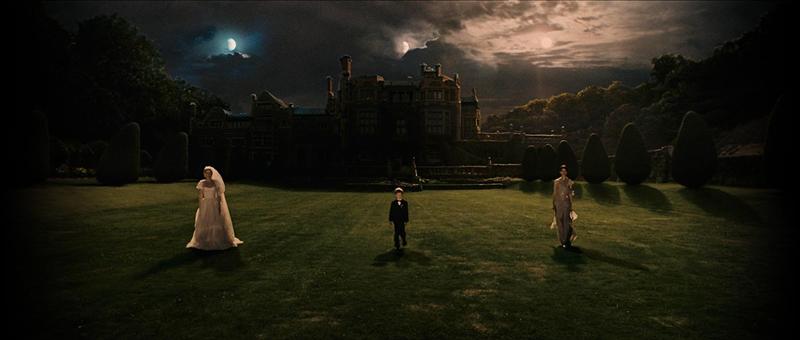
Despite the framing device of the planet Melancholia and its approach to earth, Lars Von Trier has not changed his style so much as to leap into the science fiction genre. Melancholia is never presented as anything other than a very large metaphor for depression, an affliction which forms the core of the story and which Von Trier reports struggling with himself. Science Fiction buffs are advised to give their inner physicist the day off.
Although Justine seems to have absolutely everything she could possibly want, on what should be the greatest day of her life, some poisonous remarks from her bitter mother at the wedding reception are enough to trigger a slide into the beginnings of a depressive state. Her sister and her brother-in-law have invested huge amounts of time and money into making her wedding a perfect day, and become increasingly frustrated when she does not seem to be showing the happiness they want for her, let alone gratitude. As the night wears on her depression grows and she finds it harder and harder to think, feel or do anything positive. The depression soon becomes a force of destruction, and the night does not end well.
In the second part of the film Justine is in the grip of a full-on depressive episode, and the film shifts to her sister's attempts to care for her, whilst herself becoming stressed by the approach of the melancholic planet.
Lars Von Trier is an astute observer of human psychology, creating characters with great depth and showing an insight into human relationships that few other directors manage. Although he allows himself more cinematic 'gadgets' in MELANCHOLIA than he has done for some time, he remains resolutely focussed on the characters and the actors. His understanding of psychology and his novel filming methods typically allow him to extract career-defining performances from his cast, as he undoubtedly does from Kirsten Dunst here. By turning his spotlight inward on his own experiences with depression he is able to create a very intimate and authentic study of the subject.
Watching the interviews with Kirsten Dunst on the DVD, Von Trier's talent as a director is made even more evident - apart from a few moments at the start of part 2, her performance is remarkable - but the interviews make it apparent that she herself has absolutely minimal insight into the character or the condition (in fact she appears to be a grade A idiot). Charlotte Gainsbourg is also excellent, but her interviews make it clear that she is an altogether more perceptive and professional actor and was on a similar wavelength to Von Trier herself.
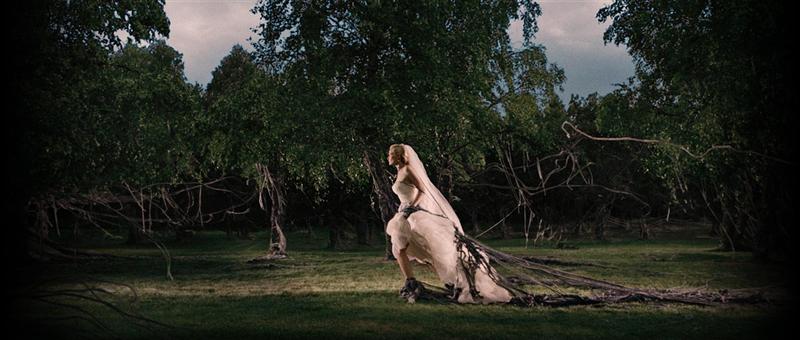
The film presents an experience of depression as an overwhelming, irresistable force in the life of those it afflicts. As melancholia takes hold, Justine is drawn irresistably to self-destructive behaviour, even knowing full well that she is going to spoil things for herself and for those around her. Just as the planet Melancholia's approach to the planet is outside the control of the characters, so Justine's depression is a force she cannot control, and the well-intentioned support of her sister does little to avert the doom which they can all see descending upon them.
Lars Von Trier does not invest much time speculating as to the origin of Justine's condition - her parents' bitter divorce and her mother's caustic personality are clearly nodded to as probable sources of Justine's psychological woes, but the film does not really care to look into this aspect of things, focussing purely on the experience of the condition itself. It is perhaps intended as a rebuke to those who would suggest that a severely depressed person "pull themselves together", or "snap out of it". Justine is no more able to do so than she can affect the course of a planet. In the grip of a depressive state she cannot even make herself want to get better... perhaps the most insidiously destructive aspect of depression.
It's arguably a rather defeatist view of the condition, suggesting that the only available course of action is to surrender to it... yet MELANCHOLIA is not itself a depressing film. The visual style and the somewhat rapturous orchestral refrains seem to give the condition a sort of grace and beauty - Von Trier describes the film as "romantic", though he berates himself for succumbing to what he considers to be a base cinematic tool. He is certainly not interested in offering us anything so trivial as hope or a possible solution though, instead just inviting us to observe and to understand.
I do regard Lars Von Trier as a genius, but that does not mean that I have actually enjoyed all that many of his films (the almost-Dogme trilogy of IDIOTERNE, Breaking The Waves and DANCER IN THE DARK being the ones that I unequivocally have). MELANCHOLIA definitely joins the ranks of Lars Von Trier films that can be enjoyed though, despite the ostensibly depressing subject matter. The fact that he has tempered his topic with concessions towards cinematic beauty makes it altogether more palattable than the aggressively antagonistic ANTICHRIST or the alienating austerity of DOGVILLE. Despite being an apparently personal subject, it feels like Von Trier is making a film for the audience rather than for himself - more concerned with our experience than making a statement about his own artistic agenda. By Lars Von Trier's standards, I guess it must be judged to be quite mainstream.
MELANCHOLIA is no commercial fluff project though, and still bears the imprint of a visionary talent. It's hard to imagine anybody else having made the film. It's a sometimes mesmerising, occasionally beautiful, never less than compelling piece of cinema.
Cast
Crew
| Director | |
|---|---|
| Writer | |
| Cinematographer |
Notes
Photo credits: Christian Geisnæs. All images copyright Zentropa.


